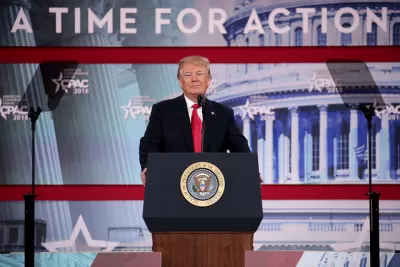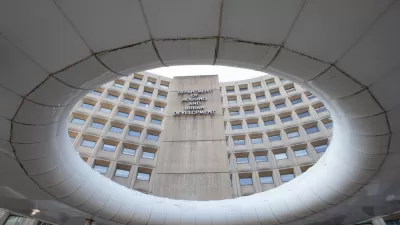New efforts by the Trump administration to potentially curtail local land use regulations require closer examination.

[Updated August 19, 2019]
The news broke yesterday that President Trump would sign an executive order creating a new, "White House Council on Eliminating Regulatory Barriers to Affordable Housing."
With the executive order now signed and made public, there's a lot more information to decipher and analyze in an effort to understand the scope of the new council's mission, its power to achieve desired effects, and how the Trump administration's new level of involvement could shake up the politics of development at the local and state levels.
Emily Badger, writing for The New York Times, notes that the motivating factor behind the new council—that regulations "stymie new housing construction"—is an idea shared by many progressive housing advocates and "even Barack Obama." But that doesn't mean that left-leaning pro-development types (YIMBY, to use the parlance of our times) will find a lot to like about this news from the Trump administration.
Over the next year, the new White House council, led by Ben Carson, the secretary of Housing and Urban Development, will study local, state and federal rules that drive up the cost of housing, delay its construction or block it entirely.
The potential list: restrictive zoning and rent control; parking requirements and energy efficiency mandates; density limits and environmental rules; lengthy permitting procedures and labor laws.
Among the voices reacting with some concern about the potential of some of the Trump administration's reforms to go awry of progressive pro-development policy, the National Low Income Housing Coalition issued a press release warning that the council "will likely work to remove important federal regulations that protect fair wages, fair housing, the environment, and more, and not the restrictive local zoning over which the federal government has very little control."
The press release also notes that despite recent statements critiquing local land use regulations, and supporting the reforms proposed by the Minneapolis 2040 Comprehensive Plan, U.S. Department of Housing and Urban Development Secretary Ben Carson has a track record of voicing support for exclusionary zoning and the protection of single-family residential neighborhoods.
As Badger notes, all these interpretations of the ideologies of housing policy "point to the strange politics of housing deregulation."
A Twitter thread by CityLab writer Kriston Capps also digs into the scope of the Trump administration's recent actions, noting especially the likely event of Community Development Blog Grants being used as the policy "stick" (as opposed to a carrot) in future federal policies designed to spur more housing production out of local governments.
Here it is: The Trump administration is launching its housing plan. (Only it’s not really a housing plan.) https://t.co/THCYsivqO1
— Overvacationing (@kristoncapps) June 25, 2019
Capps notes that a Republican senator recently proposed a law that would tie CDBG funds to unzoning and deregulation, and Democrats, like Rep. Maxine Waters (D-California) also support the idea.
Capps argues that leveraging CDBG funds "would punish poor towns and wealthy coastal liberal enclaves," which also might be "more of a feature than a bug" for Republican lawmakers.
FULL STORY: Trump Wants to Cut Regulations That Block New Housing

Planetizen Federal Action Tracker
A weekly monitor of how Trump’s orders and actions are impacting planners and planning in America.

Maui's Vacation Rental Debate Turns Ugly
Verbal attacks, misinformation campaigns and fistfights plague a high-stakes debate to convert thousands of vacation rentals into long-term housing.

San Francisco Suspends Traffic Calming Amidst Record Deaths
Citing “a challenging fiscal landscape,” the city will cease the program on the heels of 42 traffic deaths, including 24 pedestrians.

Amtrak Rolls Out New Orleans to Alabama “Mardi Gras” Train
The new service will operate morning and evening departures between Mobile and New Orleans.

The Subversive Car-Free Guide to Trump's Great American Road Trip
Car-free ways to access Chicagoland’s best tourist attractions.

San Antonio and Austin are Fusing Into one Massive Megaregion
The region spanning the two central Texas cities is growing fast, posing challenges for local infrastructure and water supplies.
Urban Design for Planners 1: Software Tools
This six-course series explores essential urban design concepts using open source software and equips planners with the tools they need to participate fully in the urban design process.
Planning for Universal Design
Learn the tools for implementing Universal Design in planning regulations.
Heyer Gruel & Associates PA
JM Goldson LLC
Custer County Colorado
City of Camden Redevelopment Agency
City of Astoria
Transportation Research & Education Center (TREC) at Portland State University
Jefferson Parish Government
Camden Redevelopment Agency
City of Claremont





























